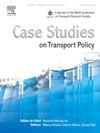Developing sustainable aviation fuel to deepen south Australia’s green economy: A BERTopic-enhanced SWOT analysis
IF 3.3
Q3 TRANSPORTATION
引用次数: 0
Abstract
Sustainable aviation fuel (SAF) is a key solution for reducing aviation carbon emissions and is expected to contribute over 65% towards the industry’s net-zero target by 2050. However, the gap between production capacity and potential demand remains significant. This paper analyses 225 inputs from 14 sustainability experts using BERTopic to enhance the analysis of Strengths, Weaknesses, Opportunities, and Threats (SWOT) to evaluate the feasibility of developing an SAF industry in South Australia. It has been found that South Australia possesses several unique comparative advantages in creating the SAF industry to further elevate the scale and quality of its green economy. The analysis shows that there is an urgent need for government collaboration with industry and research institutions to accelerate progress. Key initiatives proposed include establishing a research centre of excellence and providing supply-side incentives such as joint investment, tax credits, and low-interest loans. These measures will support research, coordinate stakeholders, build skilled workforce, reduce upfront costs, and ensure stable feedstock supplies. On the demand side, government procurement, airline credits, and uptake agreements with South Australian producers can boost market confidence.
发展可持续航空燃料,深化南澳大利亚绿色经济:BERTopic-enhanced SWOT分析
可持续航空燃料(SAF)是减少航空碳排放的关键解决方案,预计到2050年将为航空业实现净零排放目标贡献65%以上。然而,产能与潜在需求之间的差距仍然很大。本文分析了来自14位可持续发展专家的225个输入,使用BERTopic来增强对优势,劣势,机会和威胁(SWOT)的分析,以评估在南澳大利亚发展SAF行业的可行性。研究发现,南澳大利亚在创建SAF产业以进一步提升其绿色经济的规模和质量方面具有几项独特的比较优势。分析表明,迫切需要政府与工业界和研究机构合作,以加快进展。提议的关键举措包括建立一个卓越研究中心,以及提供联合投资、税收抵免和低息贷款等供给侧激励措施。这些措施将支持研究、协调利益相关者、培养熟练的劳动力、降低前期成本并确保稳定的原料供应。在需求方面,政府采购、航空公司信贷以及与南澳大利亚生产商签订的协议可以提振市场信心。
本文章由计算机程序翻译,如有差异,请以英文原文为准。
求助全文
约1分钟内获得全文
求助全文

 求助内容:
求助内容: 应助结果提醒方式:
应助结果提醒方式:


